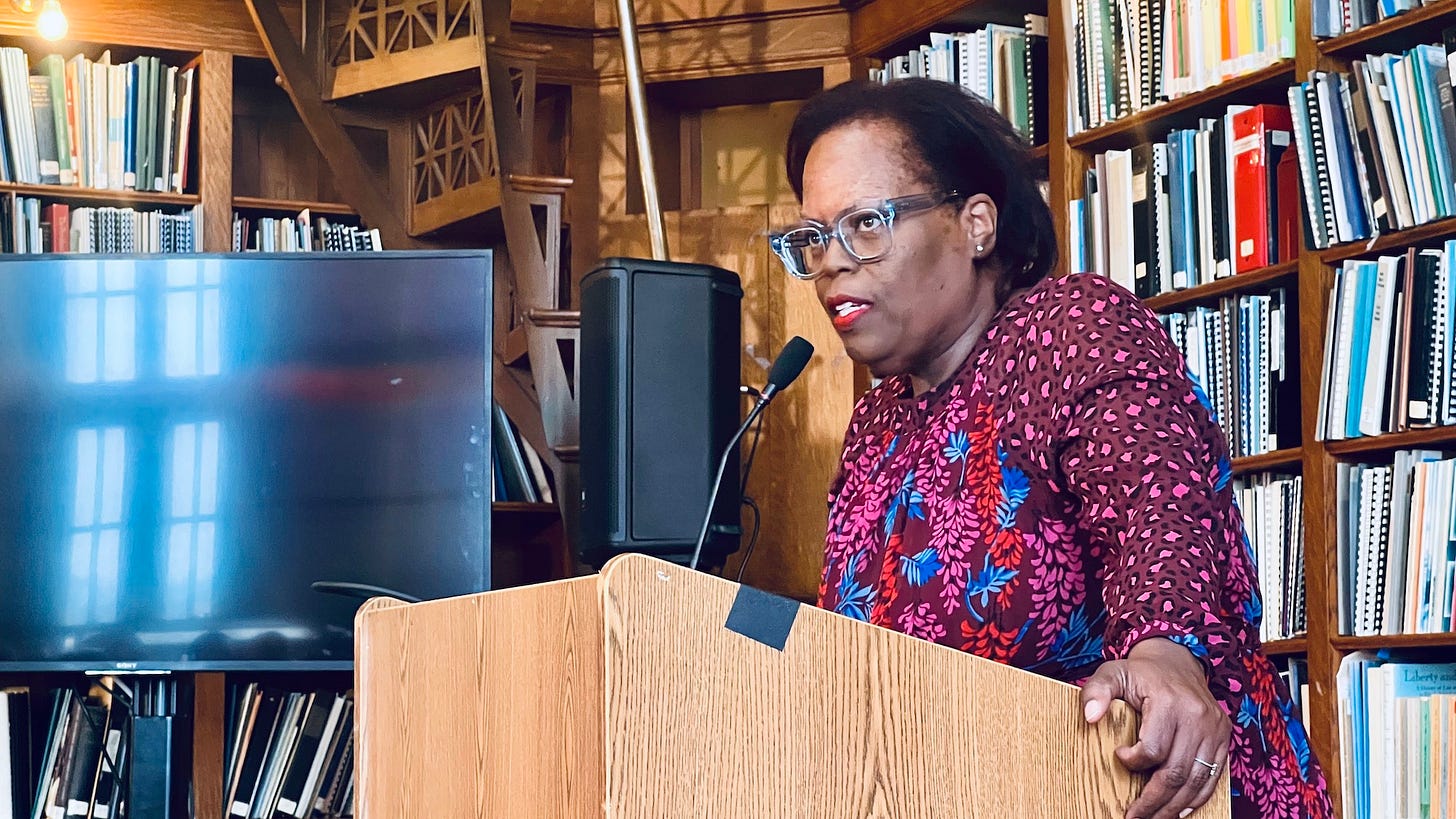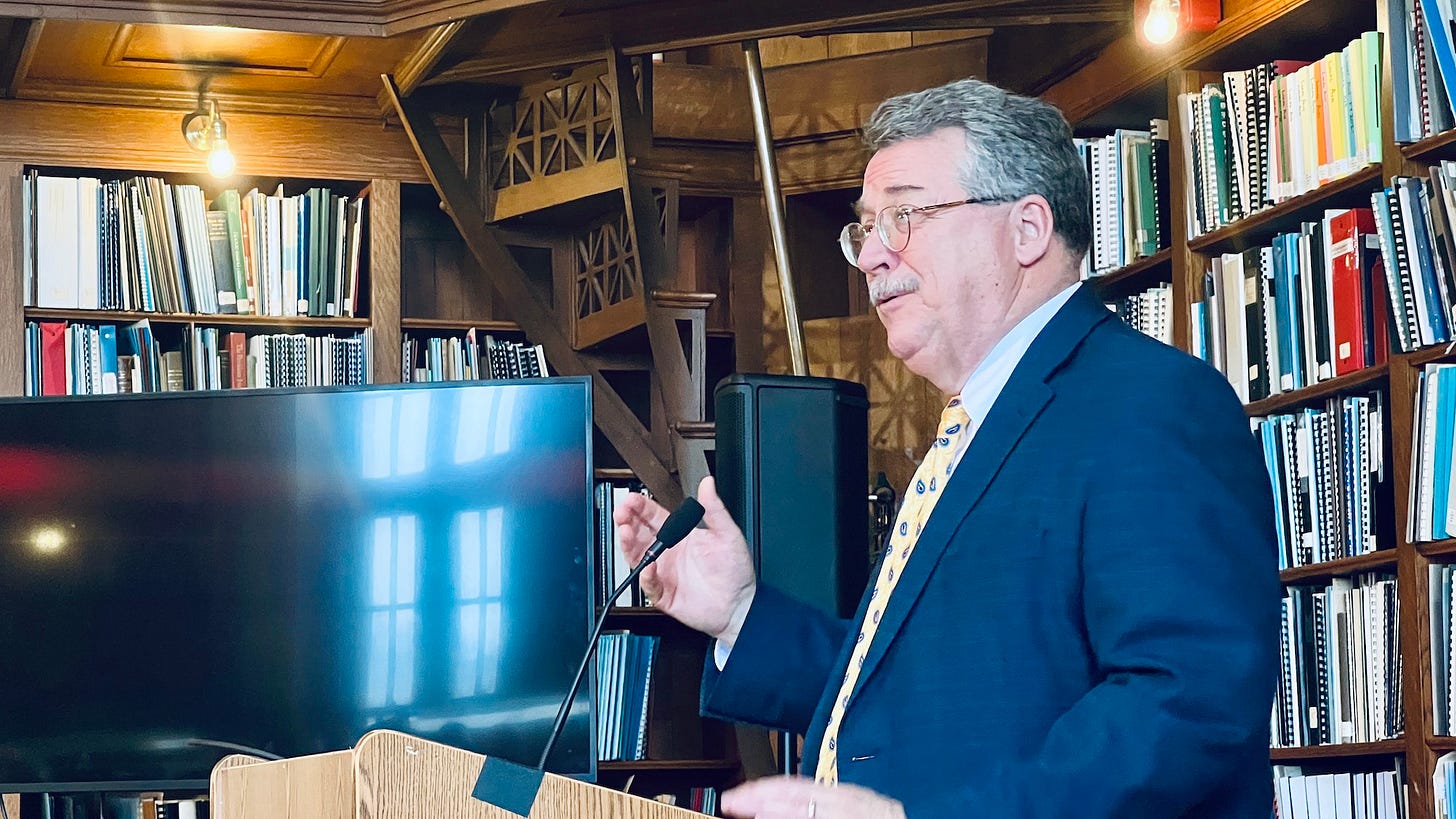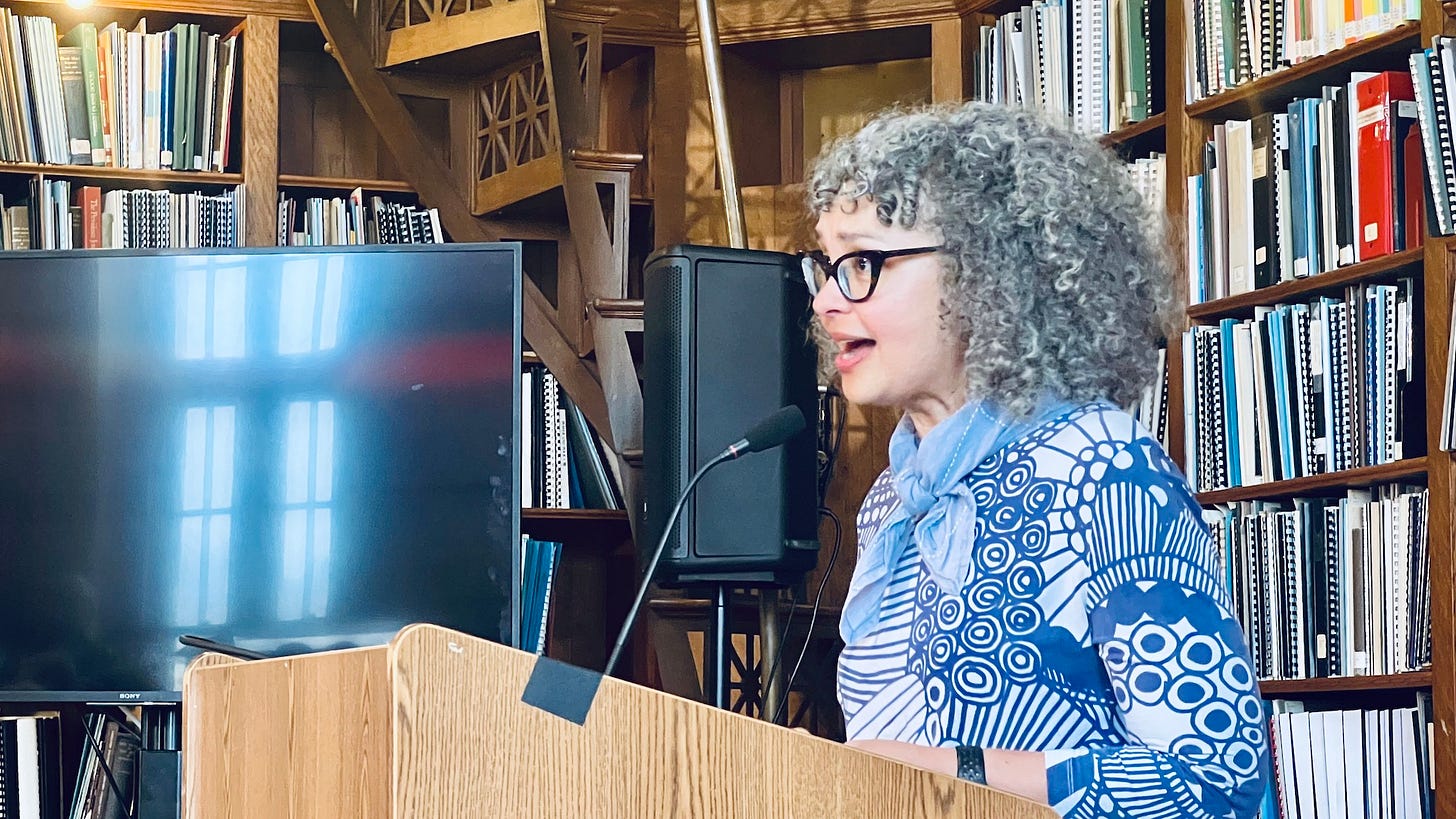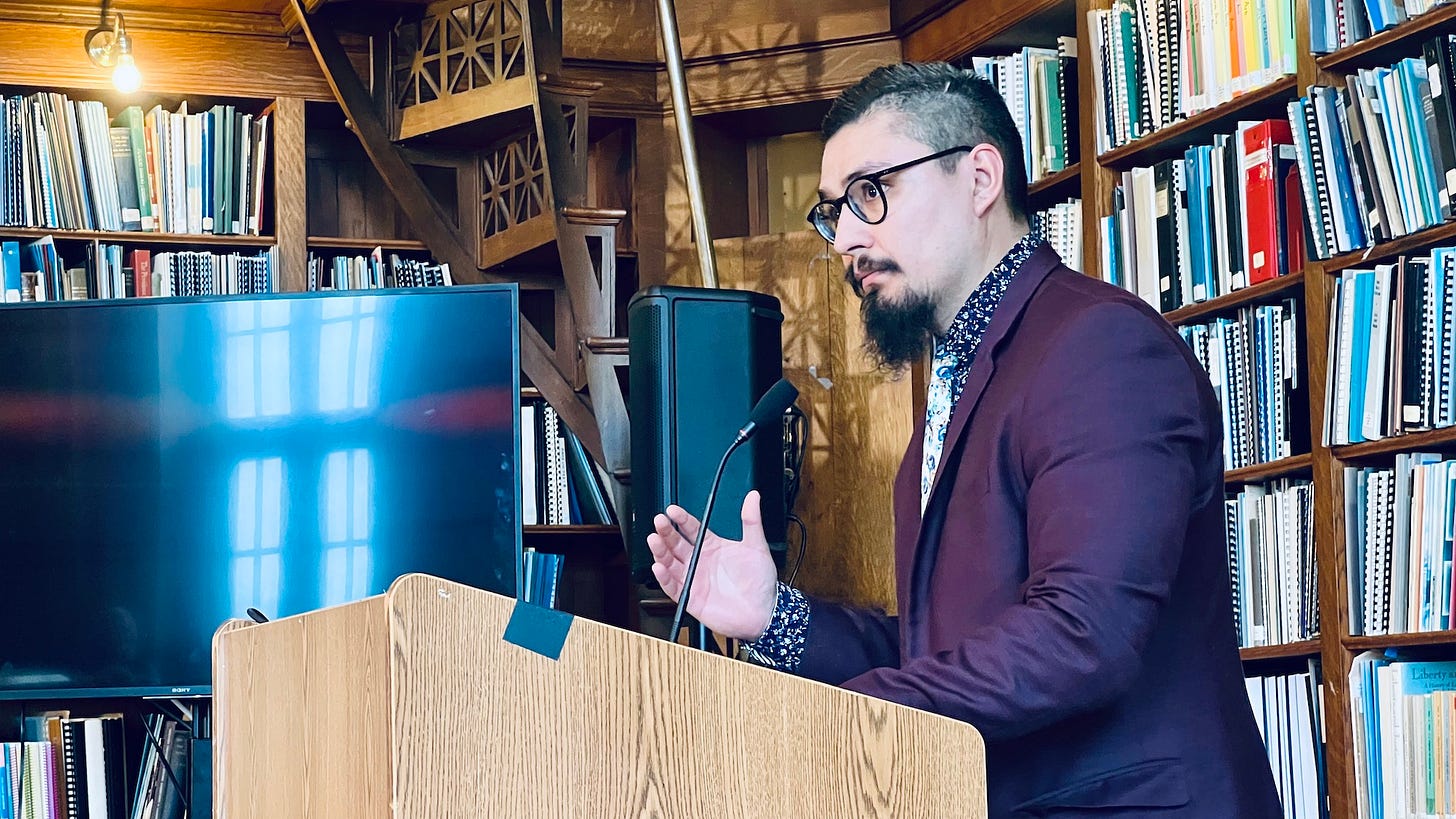The Freedom to Read: Will the General Assembly protect this foundational right?
Advocates for Love, Trust, and Democracy call for the passage of legislation to protect public libraries from partisan or doctrinal book-banning efforts...
National Library Week at the Rhode Island State House was celebrated by the Rhode Island Library Association and the Rhode Island State Council of Churches at an event calling for the passage of legislation to protect public libraries from partisan or doctrinal book-banning efforts. Politicians and advocates spoke about the importance of libraries and the freedom of conscience.
“I want to thank you for joining us today to help us celebrate Library Advocacy Day here in the State House library and also helping us to celebrate the Freedom to Read,” said Beatrice Pulliam, President of the Rhode Island Library Association, who emceed the event. “Many of the bills making their way through the legislature this session have had at least a House or Senate committee hearing already, and we're still waiting to hear the fate of the proposed resolution to fully fund libraries. As you may have heard, the current proposal is a decrease to what is outlined in the Rhode Island General Laws. We're hoping that the governor will resume the 25% of full funding to libraries.”
The first bill, the Library Shiel Act, (S2429, H7575) is sponsored by Senator Mark McKenney (Democrat, District 30, Warwick) and Representative David Morales (Democrat, District 7, Providence) and would provide an affirmative defense for libraries, schools, museums, and their employees against charges of promoting obscene material, meaning that they can negate all liability in obscenity cases brought against them by credibly showing they were acting under their educational mission.
The second bill (S2281, H7386) is sponsored by Senator McKenney and Representative Jennifer Stewart (Democrat, District 59, Pawtucket) and affirms that it is the policy of Rhode Island to encourage and protect the freedom of public libraries to acquire books and other materials without external limitations and that these materials not be banned, removed, censored, or have access to them restricted due to doctrinal or partisan disapproval.
The advocates also called on the legislature and the governor to fully fund the state’s contribution to public libraries. Representative Morales and Senator John Burke (Democrat, District 9, West Warwick) have introduced legislation (H7335, S2589) to include this funding in this year’s budget.
“The Freedom to Read Act declares emphatically that it's the policy of Rhode Island to encourage and protect the freedom of public libraries to curate their collections without limitations,” said Senator McKenney. “It protects libraries from efforts to ban, remove, censor, or restrict access to materials. It says materials should not be removed from public libraries due to partisan or doctrinal disapproval, and it upholds the notion that free public libraries are crucial to the enlightenment of the citizenry and the advancement of democracy.
“The second is the Library Shield Act. Right now Rhode Island has no explicit protection in its laws for library workers, educators, and museum workers concerning alleged obscenity. This law will protect them. 44 states, including all of New England, have laws on the books to protect folks from overzealous prosecutors or small minorities who might find a book offensive and decide to sue or seek to have criminal charges prosecuted. What [materials] are usually targeted? I think we all know that. It's no surprise. Librarians and educators teaching or having books on the usual subjects, health, sexuality, orientation, and race. Efforts to criminalize what is otherwise normal educational and library practices have included legislation and criminal complaints brought to law enforcement.
“We are a diverse community. People can decide what they wish to take out of a library or what they wish for their kids to take out, but they can't decide for other people. Unfortunately, librarians are forced to fight lawsuits and criminal charges - and frequently for books that are classics. Folks don't realize that librarians are professionals who carefully consider what goes on their shelves. Folks who complain and think books aren't scrutinized by librarians are simply wrong.
“In Rhode Island, there's a process for reviewing any book that someone complains about being inappropriate. It's a long time process. It's been in place for many years. There's no reason for any kind of lawsuit - unless that lawsuit is being used as a weapon or being used for publicity. Librarians are on the front lines defending intellectual freedom and this law, if passed, would not keep them from being sued, but it would certainly give them greater protection than they presently have.
“Think about it. The freedom to read. What could be more basic, and in these times, what could be more necessary? We should pass these bills this year.
“As the Senate bill was headed for a committee hearing this week, I took the time to watch the recent House hearings. One Representative [Brian Newberry] contended that since taxpayers are funding libraries, if a librarian is putting inappropriate books on the shelf, taxpayers should have a say. The fact of the matter is that taxpayers do have a say - just like anyone has a say and anyone has the right to complain about a book and then a process takes place. Library staff consider it. If the person isn't happy with the decision that the librarian staff makes, then it can usually be appealed to the local library board.
“Interestingly enough, a complainant does have to detail exactly what it is that they find offensive. That means that they really ought to have read the book before making the complaint. I don't know whether on the complaints there's a requirement that they attest to that, but if not, I'd suggest that there should be. But frequently that's not what we're seeing. It's not just some local citizen who's got a legitimate, serious concern about a particular book. It's someone who's got an agenda and often it's someone doing the bidding of a national organization that has an agenda and often wants to ban 50 books that are on a list.
“Something to keep in mind, particularly about the concern about the taxpayer. Sure, the taxpayers should have a say. That's true and it sounds pretty compelling. What's often overlooked though is this fact: Taxpayers are represented by local politicians [and] politicians should not be deciding what I'm going to read. Librarians do a fine job of curating their collections. They've done that for many years. I have faith in them. Do we instead want to entrust that job and those decisions to someone who is gauging how the popular winds are blowing at a particular time? I don't think so. When deciding what I can or can't read, quite frankly, the last person I want to make that call is a politician who has an upcoming election.
“Let's pass these bills.”
“There are three themes I want to highlight. One is Love, the second is Trust, and the third is Democracy,” said Representative Stewart. “The Freedom to Read bill comes out of love - my love of reading, my love of books, and my love of libraries - and concern about the ways that libraries have been pilloried, attacked, and put under threat. I'm a history teacher in my other job, not in the State House, and so much of what may have seemed not controversial and not up for debate has become controversial and up for debate. The Freedom to Read Act is staking out a clear position in that debate when it comes to libraries.
“And that brings me to the next theme of trust. This bill is about trusting librarians to do their jobs according to their professional standards. It's about trusting libraries in their function and mission to serve our communities. It's about trusting readers and the patrons of libraries to be able to make the choices that they deem to fit and suit themselves and their families.
“One thing I was thinking a lot about when preparing for today was a comment that was made during the House hearing on this bill at the end of February. One of the people who spoke in support of the bill said that in all of his life, and he was an elderly gentleman, he had never been hurt by a book and he had never been hurt by an idea that he might've read about in a book. Instead, the library and its variety of offerings helped him through some of the most difficult times in his life and helped him figure out who he was and what was important to him. People can't do that if they're only exposed to what they agree with. We need different ideas. We need to engage the whole range of what's out there and we need to trust that all of that messiness that might be part of that is okay and is essential for a democracy to function.
“I'm so proud to be the prime sponsor of this bill, and I, like everyone who is involved with these bills, believe strongly this is the right time to move forward with all of them and pass them this session.
“The Freedom to Read Act and the librarian and educator protection language in the state obscenity laws add critical language to state legislation to encourage and protect the freedom of public libraries to acquire and descension materials without limitations and to be protected against attempts to ban, censor, or otherwise restrict access to books and other materials,” said Cheryl Space, library director of the Community Libraries of Providence. “These bills allow librarians and educators to feel confident in selecting a diverse array of materials for children and youth, knowing that if they are following their board-approved collection development policy and their professional training they will have an affirmative defense.
“These bills are exceptionally important right now because there is an unfortunate narrative that is being developed and repeated about libraries, specifically the children's department, in regards to librarians indoctrinating young children to a woke agenda or grooming them to live their lives in a manner that might be objectionable to their parents or that the library is not a safe place.
“When we hear this narrative, my colleagues and I wonder if any of these concerned folks have visited a children's room recently. When you walk into a children's room, this is what you will see: Legos, crayons, glue sticks, construction paper, colorful picture books, tutors helping kids with their homework, your neighbors, and friendly librarians who smile and welcome you warmly (and who, by the way, can privately and respectfully help guide parents and children to just the right books - being respectful of their values and their family concerns.)
“Just because a book does not align with a particular parent's political views, religious views, or family values does not mean that it is obscene or pornographic and that it does not belong in the library. Public libraries hold a unique position in our often polarized society. Any person regardless of their political views, socioeconomic status, religious background, gender identity, sexual identity, age, or race can fully participate, for free, in the programs, services, and resources of their public library. Librarians have a professional responsibility to provide a diversity of materials in our collection that reflect all of the people in our American society.
“One thing that we can all agree on is that books are powerful. They're powerful because they fuel a sense of belonging and empathy. Let me tell you a story about the power of a shared story that I just witnessed on my way here. I was just at the Knight Memorial Library for a reception for Javier Zamora, who is the author of this year's Reading Across Rhode Island selection. He wrote Solito about his journey to the United States with a guide at age nine to join his parents. His father had left El Salvador when he was one and his mother when he was five and now he was nine and traveling on his own. So the children's room of the library was filled with 40 teenagers and all of them were Spanish and English speakers, many of them from El Salvador, some from Guatemala, some from other Central American countries.
“We came to the end of the talk, Javier was signing books, and I noticed a very engaged back and forth between the author and one of the young men. His teacher leaned over to me and she said, "This is the first book he ever read. He read it in English and Spanish and now he feels empowered to write and tell his own story. He advocated for us to be here today." She added the students didn't believe they were actually going to meet the author until he walked into the room because so many dreams have gone unfulfilled for these children.
“This is why books matter, and this is why we have to have these diverse stories. Many of the challenges nationwide are against people of color or members of the LGBTQIA community and library staff nationally, amidst relentless pressure and in some cases genuine harassment and accusations from outside groups, have resolutely resisted the pressure to narrow the scope of critical information and representation in our collections. Groups attempting to censor benefit from whipping up a frenzy. It's our job to apply the breaks and to make room for a thoughtful exchange between informational professionals in our library and concerned members of the public to reduce the tension and the drama of unexamined statements. Many people submit a list of a hundred books and have not read one of them. They've just been told that these books are bad. We must stand strong. We must educate people about the inherent value of the free exchange of ideas for our democracy and the role of the public library as a trusted public institution where this freedom is exercised every day. Please pass these bills and let all Rhode Islanders know that they are valued by affirming their history, their point of view, and their stories - and that they will be protected in our library collections.
“In 1612, English dissenter and early Baptist Thomas Helwys wrote what is considered by many to be the first document in the English language calling for complete freedom of conscience - a freedom Helwys uniquely and radically envisioned for all people, not just Protestant Christians. A copy was delivered to King James I and in response King James I threw Helwys into Newgate Prison where he died four years later,” said Reverend Darren Collins.
“In 1644, Roger Williams published the Bloudy Tenant of Persecution in reaction to the theocratic leanings of the Massachusetts Bay Colony, specifically Reverend John Cotton. Williams highlighted the importance of freedom of conscience, or as Roger Williams liked to call it, ‘soul liberty.’ This book was burned in England upon publication. 20 years later, thereabouts, King Charles II gave Williams a charter that holds a unique place in history. Calling it a ‘lively experiment,’ the King consented to the establishment of a colonial government that recognized the rights of individuals to exercise their conscience free from the coercion of any authority - religious or secular.
“A healthy society requires wholesome relationships, including a connection with people whose lives and beliefs may be different from our own. To establish healthy relationships, we must have encounters with others. Discovering and learning about others through books, movies, and music is an important start. To this end, our libraries and librarians should not be threatened or coerced into hiding away books or other media that are vitally important sources for engaging with one another and creating healthy relationships.
“The legislation we are supporting today stands in line with the work of Helwys, Williams, and many others in protecting Rhode Island citizens from the ideologies of superiority and exclusion held by a few that are all too often wrapped in the language of faith. As a Christian and a Baptist preacher in the tradition of Helwys and Williams, I value protections for freedom of conscience. I also value Jesus' mandate to establish wholesome relationships - especially with those who are marginalized, ignored, or rejected in wider society.
“On behalf of the Rhode Island State Council of Churches, I'm pleased to speak in support of these library protection bills. This legislation not only protects the freedom of conscience of every citizen in the State of Rhode Island, it also works to ensure the freedom of religion of people of all faiths or no faith at all, who consider it to be sacred and an ethical way of life, to seek the common good and work for an inclusive and therefore wholesome community.”
“Many years ago I was working on my doctoral dissertation and trying to live life. What I would do is go to the library with my daughter who at the time was in middle school. Now if you go back many years there were open stacks,” said Dr. Margaret Paccione-Dyszlewski, Clinical Assistant Professor of Psychiatry and Human Behavior at the Warren Alpert Medical School, Brown University. “We worked out a deal where I would sit at a table and I would give Nicole the references and she would run around and take the periodicals off the shelf and bring them to me. She was damn good at it. It was amazing. Much better than I would ever be.
“One day we were at the Fordham University library and Nicole came to me with a book and I could tell by her face that she was a little bit upset. She said, ‘Mom, look at this’ and she showed me a picture of a lynching that had taken place in the late 1800s, in one of the southern states. Would that have been the first book I would've selected for a 12-year-old? Probably not. But you know what? We had a wonderful, age-specific conversation about the picture, and it was a real, social-emotional learning moment.
“Social and emotional learning is an integral part of education and human development. According to educators and behavioral health specialists, there are five core competencies of social-emotional learning - self-management, relationship building, responsible decision-making, self-awareness, and social awareness. Constructive conversations about complicated topics are the foundation of healthy, social, and emotional learning, and books are the places where we can find those conversations. Books are a healthy supply of complex and often thorny subjects that help develop empathy, increase understanding of social issues, and enhance sound decision-making. You can't make decisions about things that you don't know about and books serve up those subjects.
“I found an interesting survey of two different groups of kids. One group had access to and conversations around inclusive topics and the other kids did not. The kids that were engaged on some regular basis around inclusive topics did better in school, had better attendance in school, and reported feeling safer and more belonging at school. That's a really big deal.
“Let's create an environment in which professionals who choose these books for us and for our children feel safe. That's the goal.
“By the way, Nicole survived childhood. She is at today's event. She's sitting in the back and listening to this. She teaches a course at the law school called Race and the Law. You can't make this stuff up.”
“Thank you to all of our librarians who day in and day out do so much to support our neighbors, said Representative Morales. “They do so much to support our community regardless of one's socioeconomic background, zip code, or age. Our public libraries serve everyone within our communities and for that reason, I've been proud to see that over the years, the state has started to recognize the importance of our libraries when it comes to our neighbors.
“Over the last two fiscal years, we ensured that we are fully funding our state's libraries and that they're receiving the full reimbursement from the state that they deserve. That's because, during the height of the pandemic, we recognized that libraries were essential. After all, our librarians did not stop engaging with our communities. They adapted.
“They ensured that all of our youth, adults, and seniors had access to resources. Even as we resumed in-person services, the momentum did not stop. Services have continued to increase. The reach for philanthropic support has continued. The engagement with our federal delegation to ensure that more federal dollars are coming back to our local libraries continues. And it is showing in increased literacy rates. It is showing in our youth who have access to the libraries after school because some of our communities don't necessarily have access to recreation centers or extracurricular activities within their public schools. That is where our libraries fill in that gap.
“Therefore, it is vital this fiscal year we remain committed to supporting our libraries and for that reason, we will continue to advocate to ensure that for the third consecutive year, our libraries are fully funded as they deserve to be.
“At the same time, we are going to ensure that our librarians feel supported in the workplace because as we have seen nationally, there have been increasing efforts to ban books or intimidate our librarians who are only trying to serve our community. That is why we are going to take a firm stance to ensure that we establish affirmative defense protections - the same protections that exist in 44 other states. We're also going to ensure that we codify into legislation what it means to ensure that our communities feel protected when it comes to diverse forms of programming for our LGBTQ+ community.
“We recognize that similar to our libraries, we cannot do this alone, because it takes a village. For that reason, we are gathered here today at the State House, as we have every year during National Library Week. It's not enough to simply say, in rhetoric, that we support our libraries and our librarians. We are here at the State House to ensure that when it comes to public funds, investments, public statutes, and laws, we are demonstrating that. Thank you for being here because your presence makes a difference.”
Here’s the video:







A wonderful afternoon! Thank you Steve for capturing it so well. Inspiring!!
Free Libraries equals Free Speech. I read a book by Steven Biko that i got out of a Library. Biko was killed by the South African police during apartheid. HIs best known essay is "I Write What I Like" . Which is why he was targeted. Censorship is evil.